Remarkable Research
For USC Dornsife undergraduates Ellen Park and Kevin Le, the idea of engineering a synthetic version of the E. coli immune system to learn how to defeat antibiotic resistance sparked a passion for research and two years of rigorous work in a laboratory.
During the 14th annual USC Undergraduate Symposium for Scholarly and Creative Work, they placed first in the life sciences category for their project, “Bioengineering a Mechanism to Override Plasmid-based Antibiotic Resistance.”
“We discovered many amazing things about the bacteria in the system and were able to compare it to the human system,” said Park, a junior biology major. “We also proved that we can possibly combat antibiotic resistance in our own bodies by looking at how E. coli does it and exploiting E. coli bacterial systems.”

Gene Bickers, vice provost for undergraduate programs and professor of physics and astronomy in USC Dornsife presents USC Dornsife undergraduates Ellen Park and Kevin Le, an award for taking first in the life sciences category for their project. They engineered a synthetic version of the E. coli immune system to learn how to defeat antibiotic resistance. Photo by Heather Cartagena.
E. coli is a strain of bacteria commonly found in humans and animals, and while some strands are harmless others contaminate food, causing food poisoning in humans and other illnesses such as pneumonia.
The team worked in the lab of Sean Curran, assistant professor of biological sciences in USC Dornsife and in the USC Davis School of Gerontology, who specializes in aging and age related diseases. With further research, Park and Le’s work may lead to the engineering of a serum that could be injected in a person and destroy his or her antibiotic resistance gene or cell, Park said.
Park and Le, a sophomore double major in physics and mathematics, were part of a team that recreated a synthetic antibiotic resistance E. coli system known as Clustered Regularly Interspaced Short-Palindromic Repeats (CRISPR), a sequence of genes responsible for detecting foreign DNA and destroying it.
Park and Le were among 172 undergraduates university-wide who competed in the symposium, which included an Undergraduate Writer’s Conference and Webfest and was sponsored by the USC Office of the Provost and coordinated by the USC Office of Undergraduate Programs. Students displayed their work in the Ronald Tutor Campus Center on April 11 for USC professors to judge. In all, 143 submissions were received from students and 165 faculty sponsors.
This year drew the highest number of entries, said Gene Bickers, vice provost for undergraduate programs and professor of physics and astronomy in USC Dornsife.
“We’re seeing a larger fraction of students doing research while earning their degrees,” Bickers said. “It may be in psychology, history, engineering, the sciences or the arts, which makes for a very diverse representation.
“I am amazed by the quality of the projects, which has continued to rise over the years.”
In their research, Le and Park’s team used the CRISPR model created by a group in the Netherlands. With the model, they recreated their own system popping genes in and out to manipulate the immune system. They were able to target and destroy antibiotic resistance genes making it vulnerable to antibiotics.
“We proved that we could theoretically plug in whatever we wanted and the system would destroy it,” Park said. “What was interesting was that the E. coli CRISPR system attacked DNA and not RNA which is a really exciting discovery because our immune system heavily involves RNA.”
Le said his time in the lab inspired him to pursue a Ph.D. and become a physicist.
“The coolest thing was taking an existing system and doing what we wanted to do with it,” Le said. “We want people to know what you can do with synthetic biology and what you can do by combining engineering and biology.”
A Different Kind of Faith
While promoting HIV education in Tanzania, Anu Ramachandran learned that some locals inflicted with the virus had replaced treatments for visits to a faith healer.
Volunteering with the USC chapter of Support for International Change, the USC Dornsife undergraduate set out to learn how the faith healer affected HIV education in Tanzania.
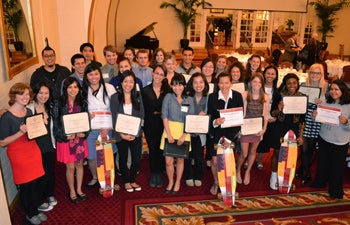
A group of winners pose with their awards.
Her project, “Faith: Friend or Foe? The Rise of Faith Healing in Tanzania and Its Impact on Community Understanding of HIV,” earned her the interdisciplinary award in the humanities category during the symposium. Ramachandran worked with Erin Moore, associate professor of anthropology in USC Dornsife, who specializes in the performance of healing.
“Faith healing is rarely talked about and is very easily dismissed by people,” Ramachandran said. “When you are working in different cultures you have to take people’s beliefs into account especially when you are trying to institute a program related to their health.”
For two months Ramachandran lived in a farmhouse with a Tanzanian family in Sangaiwe and immersed herself in the culture. She pored over media clippings found in local newspapers and listened to radio advertisements promoting the faith healer, Babu. She surveyed Tanzanians with the help of a translator to determine what factors made him such a prominent figure, what people thought about his healing abilities and what non-governmental organizations (NGOs) could do to address the issue.
Ramachandran, a junior double majoring in neuroscience and philosophy, and aspiring physician, hopes her findings can be used to enhance HIV education curriculums in Tanzania.
Through her work, Ramachandran discovered that a majority of those she interviewed believe Babu has some power to heal. Many people surveyed reported that they were open to HIV treatment designed by medical practitioners that included a faith healing portion.
“We are trying to create a holistic approach starting from a place of cultural understanding,” she said.
DNA Doubt
USC Dornsife senior Adrienne Scotti, a senior double majoring in psychology, and forensics and criminality, explored how juries incorporate evidence into perceptions of guilt. For the past year, she has examined how jurors review DNA evidence.
Her project, “The Effects of Database Type and Forensic Laboratory Error Rates on the Probative Value of DNA Evidence in a Cold Case,” earned her first prize in the social sciences category.
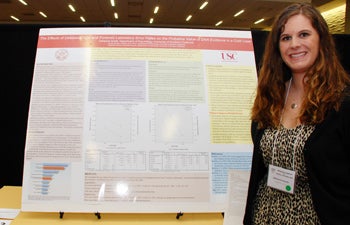
USC Dornsife senior Adrienne Scotti, a senior double majoring in psychology, and forensics and criminality, earned first prize in the social sciences category for her project. She focused on whether DNA error rates affected how juries determined a defendant’s guilt. Photo by Ambrosia Brody.
Scotti surveyed people about whether DNA error rates affected how they determined a defendant’s guilt.
Scotti’s research showed that a high DNA error rate leaned in favor of a defendant’s possible innocence.
“There hasn’t been a lot of research done in this area,” Scotti said. “Knowing that jurors are able to look at errors and take that information into account should help decrease wrongful convictions when DNA evidence is involved.”
Scotti worked with USC Dornsife Associate Professor of Psychology Richard John, an expert in legal decision-making, and Nicholas Scurich, a teaching assistant in psychology in USC Dornsife.
The findings could potentially help attorneys understand what type of evidence influences juries in their decisions of guilt.
“I have plans to continue my research,” she said “I want to make sure that jurors are able to be as unbiased as possible.”
Genghis Khan Revisited
USC Dornsife junior Linda Dahl, who is double majoring in political science and history, combined her interests in Russia and the Mongol Empire to examine the time when the Mongols took control of Russia during the 13th century.
Her project, “The Golden Horde and the Emergence of Muscovy,” won an interdisciplinary award in the social sciences category. She worked with Azade-Ayse Rorlich, professor of history and Slavic languages and literatures in USC Dornsife, who studies Russian and Eurasian social and cultural history.
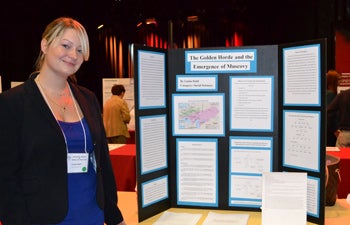
USC Dornsife junior Linda Dahl, who is double majoring in political science and history, won an interdisciplinary award in the social sciences category. She was among 172 undergraduates university wide who competed in the symposium. Photo by Ambrosia Brody.
Dahl looked at how Kahn and his descendants furthered trade, lowered trade tariffs and implemented religious freedom in the empire — a revolutionary move at the time.
The aspiring lawyer concluded that if the Mongol Empire had not ruled Moscow, there would never have been modern-day Russia.
Reflections on Thoreau
USC Dornsife senior Gregory Woodburn, a history major, examined Henry David Thoreau’s A Week on the Concord and Merrimack Rivers as a reflection of death and rebirth.
In the book, Thoreau reminisces about a trip he took with his late brother, John, to the White Mountains in New Hampshire. Through the storytelling, Thoreau discusses topics from poetry to criticism of religious institutions.
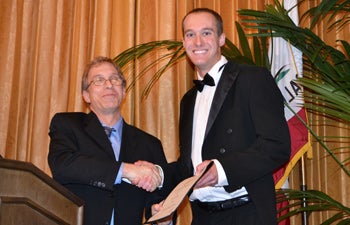
Bickers presents Gregory Woodburn, a history major in USC Dornsife, with an award for his project, which won first prize in the humanities category for his project on Henry David Thoreau. Photo by Heather Cartagena.
Woodburn’s project, “Necessary of Life: Henry David Thoreau’s Concepts of America’s Problematic Progress, 1837–1962,” won first prize in the humanities category. Woodburn began working on the project in the Fall with Karen Halttunen, professor of history in USC Dornsife. Brett Sheehan, associate professor of history in USC Dornsife, served as faculty adviser.
“Thoreau is reflecting upon the time that his brother was with him,” Woodburn said, “but at the same time he is also crystalizing the time through the process of writing these memories.”
Rather than viewing loss as inevitable, the author applied nature’s cycles of growth, decay and rebirth.
The book bridged Thoreau’s feelings of personal loss with larger losses facing America. Through his writing, Thoreau attempts to understand the death of his brother not as a permanent loss, but within the larger natural cycle of decay and reincarnation.
“There are certain passages and stories in Thoreau’s work that can tell us so much about the human condition,” Woodburn said.
A Cultural Look at Environmental Ads
Emily Gee, a senior double major in political science and public relations with a minor in environmental science, and Lisa Cui, who in 2011 graduated with a bachelor’s in political science in USC Dornsife took first prize in the social sciences category for their project, “Chinese and American Emotional Responses to Environmental Advertisements.” Read more about their research.
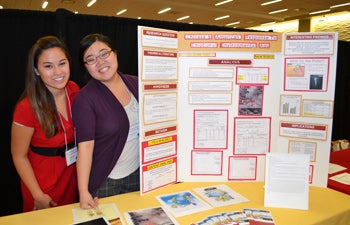
Emily Gee, a senior double major in political science and public relations with a minor in environmental science, and Lisa Cui, who in 2011 graduated with a bachelor’s in political science in USC Dornsife took first prize in the social sciences category for their project on emotional advertisements. Photo by Heather Cartagena.
Research Symposium Winners:
Arts
1st Prize
Stacy Kwok
“Truth in Making, Craft: An Architectural Inquiry”
Faculty Adviser: Lee Olvera, USC School of Architecture
2nd Prize
Tam Banh
“Revitalizing Los Angeles River —Taylor Yard Farm”
Faculty Adviser: Lawrence Scarpa, USC School of Architecture
Honorable Mention
Marcello Dolce
“[ ]”
Faculty Adviser: Patrick Jackson and Ann Page, USC Roski School of Fine Arts
Interdisciplinary Award
Erin Cuevas, John Farrace
“Welcome to Beautiful Juarez”
Faculty Adviser: Mario Cipresso, USC School of Architecture
Humanities
1st Prize
Gregory Woodburn
“Necessary of Life: Henry David Thoreau’s Concepts of America’s Problematic Progress, 1837-1862”
Faculty Adviser: Karen Halttunen and Brett Sheehan, both of history in USC Dornsife
2nd Prize
Anna Bishop
“Macro-Mapping the Maya: A Large-scale GIS Analysis of Maya Settlement Patterns in Belize”
Faculty Adviser: Lynn Swartz Dodd, religion in USC Dornsife
Interdisciplinary Award
Anu Ramachandran
“Faith: Friend or Foe? The Rise of Faith Healing in Tanzania and Its Impact on Community Understanding of HIV”
Faculty Adviser: Erin Moore, anthropology in USC Dornsife
Honorable Mention
Marrissa Emond
“The Past and Present Menstrual Practices of the Dayak of West Kutai, Borneo: An Examination in Context for Behavioral Ecology and Sociobiology”
Faculty Adviser: Robert Delgado, biological sciences in USC Dornsife
Life Sciences
1st Prize
Kevin Le, Ellen Park
“Bioengineering a Mechanism to Override Plasmid-based Antibiotic Resistance”
Faculty Adviser: Sean Curran, USC Davis School of Gerontology
2nd Prize
Linda Peng
“Genetic and Functional Analysis of CYCP2;1 in Arabidopsis”
Faculty Adviser: Xuelin Wu, biological sciences in USC Dornsife
2nd Prize
Sarah Waliany
“Role of Bone Morphogenetic Proteins in Promoting Metastasis of Breast Cancer Cells to the Brain”
Faculty Adviser: Rahul Jandial, biological sciences in USC Dornsife
Honorable Mention
Barsegh Barseghian, Mary Boyadjian
“Green Tea Polyphenols Preconditioning against Ischemic Stroke”
Faculty Adviser: Rayudu Gopalakrishna, Keck School of Medicine of USC
Honorable Mention
Brooke Sanders
“Intra-articular Glucocorticoid Injections as a Cause for Adrenal Insufficiency”
Faculty Adviser: John Carmichael, Pituitary Center at Cedars-Sinai Medical Center, Los Angeles; and Albert Herrera, biological sciences in USC Dornsife
Most Innovative
1st Prize
Avril Pitter, Kirsten Rice, Kristen Sharer
“Optimization of Biodiesel Production from Algae through Ultrasonication Extraction Method”
Faculty Adviser: Stephanie Olague, Massoud Pirbazari, and Varadarjan Ravindran all of USC Viterbi
2nd Prize
Stephanie Lam
“A Novel Method for Rib Periosteum Autografts in the Mouse for the Purpose of Assessing Bone Regeneration”
Faculty Adviser: Francesca Mariana, Eli and Edythe Broad Center for Regenerative Medicine and Stem Cell Research at USC
Honorable Mention
Lori Chen
“Architecture as a Vehicle for Social Change in Southeast Asia”
Faculty Adviser: Jinhee Choung, political science in USC Dornsife; and James Steele, USC School of Architecture
Physical Sciences and Engineering
1st Prize
Hannah Gray, Aditi Yokota-Joshi
“Removal of Radioactive Uranium from Groundwater Using Nanoparticle Technology and Adsorption Mechanisms”
Faculty Adviser: Massoud Pirbazari, Varadarjan Ravindran both of USC Viterbi School of Engineering
2nd Prize
Sarah Hester, Steven Leverette, William Murray
“Thrust Augmentation of a Solid Rocket Motor by Means of Inert Gas Injection”
Faculty Adviser: Dan Erwin, Joseph Kunc, both of USC Viterbi
2nd Prize
Jenny Zhang
“Hydrogen Generation from Formic Acid Using Ruthenium Carbonyls as Catalysts: Kinetic and Spectroscopic Study of the Reaction Mechanism”
Faculty Adviser: Miklos Czaun, Alain Goeppert, Surya Prakash all of chemistry in USC Dornsife
Honorable Mention
Aaron Henehan
“Deconstructing the Rebound with Optical Tracking Data”
Faculty Adviser: Yu-Han Chang, Sam Danesis, Rajiv Maheswaran, all of USC Viterbi
Honorable Mention
Avril Pitter, Kirsten Rice, Kristen Sharer
“Optimization of Biodiesel Production from Algae through Ultrasonication Extraction Method”
Faculty Adviser: Stephanie Olague, Massoud Pirbazari, and Varadarjan Ravindran all of USC Viterbi
Social Sciences
1st Prize
Lei (Lisa) Cui, Emily Gee
“Chinese and American Emotional Responses to Environmental Advertisements”
Faculty Adviser: Ann Crigler, political science in USC Dornsife
1st Prize
Adrienne Scotti
“The Effects of Database Type and Forensic Laboratory Error Rates on the Probative Value of DNA Evidence in a Cold Case”
Faculty Adviser: Richard John, Nicholas Scurich, both of psychology in USC Dornsife
2nd Prize
Leandra Fraser
“Es Mejor Saber: A Proactive Approach to Gestational Diabetes Follow Up”
Faculty Adviser: Penina Segall-Guitierrez, Keck School of Medicine of USC
2nd Prize
Tyler Vestal
“The Accuracy of Pseudo-Temporal Questions in Interviews of Children”
Faculty Adviser: Thomas Lyon, USC Gould School of Law
Honorable Mention
Mariah Gill
“Predicting the Success of Community based Resource Management Programs: Waihe’e, Maui, Hawai’i Case Study”
Faculty Adviser: James Fawcett, environmental studies in USC Dornsife
Honorable Mention
Jordan Weiss
“Antitrust: Policy, Prices, and Behavior”
Faculty Adviser: Michael Sproul, economics in USC Dornsife
Interdisciplinary Award
Linda Dahl
“The Golden Horde and the Emergence of Muscovy”
Faculty Adviser: Azade-Ayse Rorlich, history in USC Dornsife